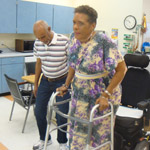
By Cynthia Flash
Special to The Medium
As the daughter of Seattle civil rights leader Randolph Carter, Carolyn Lewis-Carter has lived a full life. She has degrees from Seattle Central College, the University of Washington and Heritage College and spent her career teaching children at Van Assault Elementary and Spruce Street School. Now age 69, she remains active in the community.
As Lewis-Carter has watched the years go by, she’s faced several health problems. Fibromyalgia, sarcoidosis, and other immune diseases have left her needing to spend much of her time in a motorized wheel chair. But that doesn’t stop her from swimming, going to church, staying in touch with her active family, and shopping. She lives independently in an apartment behind Harborview Medical Center in Seattle and credits much of her independence to being a participant in Providence ElderPlace, a program that serves seniors, many who are so sick or frail they would qualify to live in a nursing home.
This year Providence ElderPlace celebrates 20 years of serving this population. It’s main center is located in the Rainier Vista complex on Martin Luther King Jr. Way South. It has another stand-alone center in West Seattle and one in Kent and two more that serve residents inside two assisted living facilities. Operated by Providence Health & Services, Providence ElderPlace has grown to serve more than 500 participants. Each receives wrap-around services that keep them healthy and in the community, whether that’s in their homes alone, with family, in an adult family home, or assisted living facility. Providence ElderPlace provides them with all of their medical care, adult day health and social services, transportation to the Providence ElderPlace centers, and in some cases even covers housing. Many participants have multiple chronic diseases and 85 percent qualify for both Medicare and Medicaid.
Lewis-Carter, a Providence ElderPlace participant since 2011, considers the program a lifesaver because of the intense healthcare management she receives. “I didn’t know which way to turn to pay the bills. It came at the best time. It was easy to understand, transportation is provided, everything is under one roof,” said Lewis-Carter, who gets her healthcare supplies, dental care, glasses, medications and all her other healthcare from Providence ElderPlace. “When I stepped in the building I couldn’t believe it. They have very caring staff members. If you have a concern or problem, they’re happy to help you through the system.”
Because Providence is paid a monthly rate per participant, the program is incentivized to keep its participants as healthy as possible by closely monitoring their health, their medications and their well-being to keep them out of the hospital and the nursing home.
Not only does Providence ElderPlace keep its participants living in the community and saves the government money, its outcomes are impressive. At a time when healthcare systems are penalized for hospital re-admissions, Providence ElderPlace’s numbers outperform the average population in many areas:
• While the hospital re-admission rate for the general Medicare population is 20 percent over a 30-day period, it’s under 10 percent for Providence ElderPlace.
• Mortality of those needing help with more than six activities of daily living (ADLs) for the general Medicare population is 28 percent, compared to 16 percent for Providence ElderPlace participants.
• While 54 percent to 66 percent of Medicare patients die in a hospital or nursing facility, only 14 percent of Providence ElderPlace patients do.
• While only 10 percent to 30 percent of Medicare patients have an advanced directive or Physician Orders for Life-Sustaining Treatment (POLST), 96 percent of Providence ElderPlace patients do.
“These numbers can be attributed to the intense managed care each participant receives,” said Susan Tuller, the program’s executive director. “We truly believe that if this program did not exist, a significant number of our participants would need nursing home care or would be at significant risk for hospitalization because they’re not in settings providing all the care they need.”
Robert Hellrigel, chief executive of Providence Senior and Community Services, which oversees Providence ElderPlace, said many people come to the program as their lives are spiraling out of control. “They can’t manage their chronic conditions. They don’t understand their options. They fear going to a nursing home and don’t know where to turn. Providence ElderPlace wraps you up in this big warm blanket and says `you’re covered, we’re going to get your symptoms under control.‘“
Lewis-Carter agrees. “I’ve been talking to people about this program. There are so many people who should be in the program,” she said. To qualify for Providence ElderPlace, people must be at least 55 years old, live within certain areas of King County, and be certified by the state of Washington for nursing home-level care. Providence ElderPlace accepts Medicaid or private payment.
Providence ElderPlace is part of the national Program of All-Inclusive Care for the Elderly (PACE), started in 1990 to provide the entire continuum of care and services to seniors with chronic care needs while maintaining their independence in their home for as long as possible. Providence expects to expand the program in the future and is seeing younger participants with different healthcare problems including multiple sclerosis, traumatic brain injury from a stroke or accident, and those who are developmentally delayed and aging out of the system that previously served them.
Dr. Assad Kazemi, who has been the Providence ElderPlace medical director nearly since the program’s inception, said he often hears his patients and their families tell him how much Providence ElderPlace has helped. “They say, `now I have a life of my own. I can focus on my kids and grandchildren because I know you’re looking after me.’”












